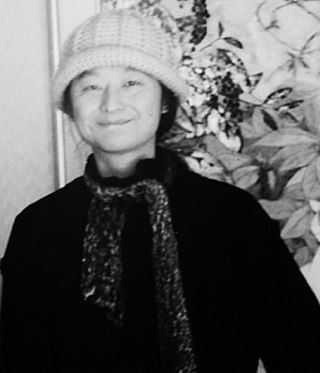
Shirō Sagisu is a Japanese composer, arranger and music producer. With a career spanning over 40 years, he is best known for his works as a record producer for acts including various choir members Mike Wyzgowski, Misia, Satoshi Tomiie, and Ken Hirai. Sagisu has also worked as a film composer for several anime and films, being well known for his collaborations with Gainax, especially in the soundtrack of Hideaki Anno's series Neon Genesis Evangelion.

"Catch the Rainbow" is the twenty-first single by Japanese recording artist Misia.

"Edge of This World" is a song recorded by Japanese singer Misia for her tenth studio album, Soul Quest. It was released by Ariola Japan in truetone format on April 14, 2011 and as a digital single on April 28, 2011. It is the theme song to the anime film adaption of King of Thorn.
The soundtracks of Neon Genesis Evangelion were produced for the 1995 anime series of the same name and its sequels, remakes and spinoffs. Shiro Sagisu composed the tracks under the direction of Hideaki Anno, director of the series. In addition to Sagisu's compositions, the soundtracks include pieces by Masami Okui, Kotono Mitsuishi and a wide repertoire of classical music, including symphonies by Beethoven, Bach, Giuseppe Verdi and other composers. Under the direction of Toshimichi Ōtsuki, a representative of King Records and one of the producers of the series, "A Cruel Angel's Thesis" was composed as the series' opening theme song. The series used "Fly Me to the Moon", originally written by Bart Howard, as the closing theme song. Different versions of the song were recorded by British singer Claire Littley, Yoko Takahashi and the anime's main female voice actors, Megumi Hayashibara, Kotono Mitsuishi and Yuko Miyamura.
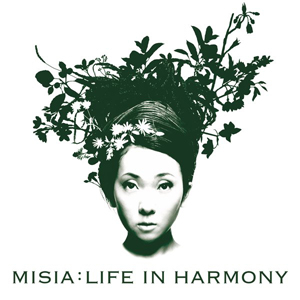
"Life in Harmony" is a song recorded by Japanese singer Misia for her tenth studio album, Soul Quest. It was released as a digital single on September 15, 2010. A CD single was produced and included as a limited bonus on the Hoshizora no Live VI Encore 2010 International Year of Biodiversity concert DVD. The four-track CD single was later released as a digital EP on November 10, 2010. "Life in Harmony" was the official song for the tenth Convention on Biological Diversity, of which Misia was named an honorary ambassador. Misia performed the song at the convention held at the Nagoya Congress Center on October 18, 2010.
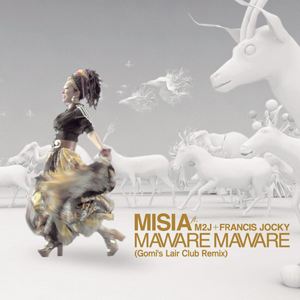
"Maware Maware" is a song recorded by Japanese singer Misia featuring Muro and JP, credited under the pseudonym M2J, and French-Cameroonian singer Francis Jocky. The song was released through the official soundtrack of the 2010 FIFA World Cup, Listen Up! The Official 2010 FIFA World Cup Album, making Misia the first Asian artist to contribute a song for a FIFA album.

"Kioku" is a song recorded by Japanese singer Misia for her tenth studio album, Soul Quest. It was released as the album's lead single by Ariola Japan on May 25, 2011. "Kioku" is the theme song to the EX drama series Iryū Sōsa, starring Takaya Kamikawa.

"Ashita e" is a song recorded by Japanese singer Misia, from her tenth studio album Soul Quest. A live version of the song was released as a charity single to benefit relief efforts following the 2011 Tōhoku earthquake and tsunami through Ariola Japan on April 27, 2011.

Soul Quest is the tenth studio album by Japanese singer Misia. It was released on July 27, 2011, through Ariola Japan. The album yielded three official singles, the digital exclusives "Edge of This World" and "Life in Harmony", and the sole physical release "Kioku". The lead track, "This Is Me", served as promotional single for the album.

Misia no Mori: Forest Covers is the first covers album by Japanese singer Misia. It was released by Ariola Japan on December 14, 2011. The album consists of cover versions of songs by soul musicians, including Michael Jackson, Stevie Wonder, Marvin Gaye, among others, reworked Christmas standards and one newly recorded original song by Misia.

"Koi wa Owaranai Zutto" is a song recorded by Japanese singer Misia. It was co-written by Misia and Jun Sasaki and produced by Misia. "Koi wa Owaranai Zutto" was released as a single simultaneously with the Tour of Misia Japan Soul Quest concert DVD on June 20, 2012, through Ariola Japan. The title track served as theme song for the NHK drama series Hatsukoi, starring Yoshino Kimura.

"Back in Love Again" is a song recorded by Japanese singer Misia. It was written by Misia and composed and produced by Japanese musician Tomoyasu Hotei, who is featured on the track as guitarist. "Back in Love Again" was released as a single by Ariola Japan on December 19, 2012. It served as theme song to the 2012 film Ōoku: Eien - Emonnosuke / Tsunayoshi-hen, also known as The Castle of Crossed Destinies, in continuation with her previous single, "Deepness", which is the theme song to Oōku Tanjō - Arikoto / Iemitsu-hen, the film's prequel television drama.

New Morning is the eleventh studio album by Japanese singer Misia. The album was released by Ariola Japan on April 2, 2014, the same day as the 77th and final date of Misia's nationwide Hoshizora no Live VII: 15th Celebration concert tour, at the Bunkamura Orchard Hall, which was broadcast live on YouTube. The album yielded the singles "Shiawase o Forever" and "Boku wa Pegasus Kimi wa Polaris". The lead track "Hope & Dreams" was released as a promotional single for the album.
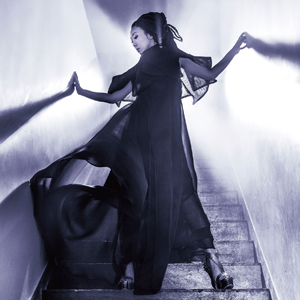
"Shiroi Kisetsu" is a song recorded by Japanese singer Misia, from the album Love Bebop. It was released as the album's lead single digitally on February 4, 2015, through Ariola Japan. It was released as a limited double A-side CD single alongside the song "Sakura Hitohira" a week later, on February 18, 2015. The song was co-written by her0ism and Yuuki Idei, and arranged and produced by her0ism. The song is featured as theme song on the soundtrack of the EX drama series Second Love starring Kazuya Kamenashi and Kyoko Fukada. The limited physical release includes a piano rendition of "Shiroi Kisetsu" as a hidden track.

"Orphans no Namida" is a song recorded by Japanese singer Misia. It was released on 25 November 2015 by Ariola Japan as the fifth and final single from her twelfth studio album, Love Bebop (2016). Misia wrote the lyrics and Shirō Sagisu composed, arranged and produced the track. "Orphans no Namida" serves as the first ending theme to the 2015 anime series Mobile Suit Gundam: Iron-Blooded Orphans. In commemoration of the 70th postwar broadcast, Misia performed the album version of "Orphans no Namida" at the 66th NHK Kōhaku Uta Gassen, live from the Nagasaki Peace Park.

Love Bebop is the twelfth studio album by Japanese singer Misia. It was released on January 6, 2016, through Ariola Japan. The title, which is synonymous with love freestyle, was inspired by the evolving LGBT movement in Japan, leading Misia to draw a parallel between the growing societal recognition for all forms of love and the various messages of love depicted on the album. On the album's eponymous title track, Misia quotes former American president Barack Obama, who declared "love is love" in a speech given in the aftermath of the Supreme Court of the United States's landmark decision to legalize same-sex marriage nationwide. The album yielded five singles, "Shiroi Kisetsu" / "Sakura Hitohira", "Orphans no Namida" and the digital exclusive double A-side single "Nagareboshi" / "Anata ni Smile :)".
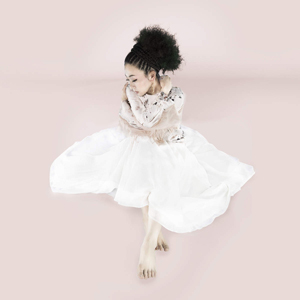
"Sakura Hitohira" is a song recorded by Japanese singer Misia, from the album Love Bebop. It was released as the album's second single digitally on February 11, 2015, through Ariola Japan. It was released as a limited double A-side CD single alongside the song "Shiroi Kisetsu" a week later, on February 18, 2015. The song was written by Misia, composed by her0ism and Shirose, from the band White Jam, and arranged and produced by her0ism. It was written specifically for the three-night TX drama The Eternal Zero, adapted from the film by the same name and starring Osamu Mukai, for which it serves as theme song.
"Hope & Dreams" is a song recorded by Japanese singer Misia for her eleventh studio album New Morning. It was released digitally as a promotional single by Ariola Japan on March 19, 2014.
"Holiday" is a song recorded by Japanese singer Misia, from her fourth compilation album Super Best Records: 15th Celebration. It was released digitally as a promotional single by Ariola Japan on January 30, 2013. The song was written by Misia, composed by Kenji Hayashida and arranged by DJ Gomi.

Misia Soul Jazz Session is the second extended play by Japanese singer Misia. It was released on July 26, 2017, through Ariola Japan. The album was entirely produced and arranged by Takuya Kuroda. It features reworked versions of her previous material with a soul-jazz arrangement, as well as two new songs and a cover of Kai Band's "Saigo no Yogisha", from the album Kono Yoru ni Sayonara (1977).

















